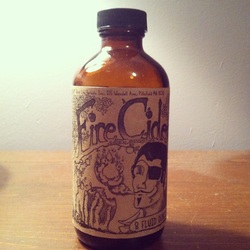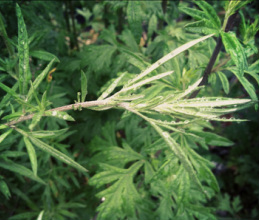 Yesterday I went to my local health food store to purchase a few herbs and supplies that I needed for an immunity class I was teaching over the weekend. While I was there I also picked up a bottle of fire cider, the strongly infused, herby, garlic-y vinegar. I figured I might as well bring it to show my class and have them taste a potent traditional recipe that’s helpful for cold and flu season. I usually make my own fire cider, but since I didn’t have any of my own on hand, I wanted to try the Shire City Herbals brand. I’d seen them around before, they have a cool label, and they are a local Massachusetts company – bonus points all around. Later I tried it, and it’s good stuff. I was pleased. However, ironically enough, just hours after I had purchased the fire cider I was alerted to some alarming news. Herbal friends on Facebook started posting information that Shire City Herbals had, unbeknownst to anyone else, previously filed a trademark on the words “fire cider”. My first thought was “that’s ridiculous!” and then my second thought was “wait, can they really do that?!” The thing is, Shire City did not invent the name “fire cider.” That name has been around for decades (if not longer) and was coined, or at least made famous, by Rosemary Gladstar of Sage Mountain. Shire City was just the first to legally claim it as its own. It now officially belongs to them, not to all of us fire cider makers. It’s as if they took the name of their grandmother’s family recipe and slapped a trademark on it, preventing any other grandchildren from calling their versions of the recipe the original name. What was once a part of herbal folklore is now legal property of a business. Actually, this business went beyond just trademarking, since anyone can add an unregistered ™ to anything. The purpose of an unregistered trademark is to put your competition on notice of your intellectual property. (Read more here.) Shire City went one step further by choosing to register the term "fire cider" with the government for an official trademark certificate. Now they can use a registered mark to signify that “fire cider” is their intellectual property. If you search for a while you can spot the ® subtly hidden in the leaves and branches on the right side of the label. Shire City’s response to concerned Facebook postings is straight forward: “We are not asking anyone to change their recipe or process, just the name of the product they are selling.” I am sure the owners of City Shire Herbs are good people, and they probably didn’t intend to alienate the herbal community with their product. In fact, if it weren’t for all this nonsense they should be applauded for bringing more awareness to traditional recipes like fire cider. I understand the need of a small business to protect itself and its products, and I whole-heartedly support herbalists making a living from their craft. But this tactic of trademarking the name of a traditional herbal remedy just feels so weird and antithetical to the whole spirit of herbalism from which fire cider itself originates. That a common term of folk herbalism now “belongs” to company is a scary and disconcerting thing indeed. Sue Kusch of The Withered Herb talks more about the ownership of language and her personal experience here. My concern is that this sets a precedent for future ownership of folkloric terms. What’s next? On a personal note, every winter I make a batch of fire cider and sell it for holiday gifts. This year I took a lovely recipe presented by Juliet Blankespoor and made it my own with a few omissions (no peppers) and a few additions (schisandra berries). I labeled it as Red Fire Cider. What will I do next year? Well, the same thing again… it’s going to be called fire cider, because that’s what it is. And I won’t be alone in doing it. In fact, I bet many who are fans of this little blog will be doing it too. I am not writing all this because I am upset that a company prohibits me from labeling my products as Fire Cider, but because I think it foreshadows a larger and potentially more destructive trend that is to come. I ask and encourage the herbal community to speak up and join in this conversation. Please, let’s share our thoughts and concerns in a constructive way. I know it sounds naive in our market-driven world, but the beauty and power of traditional herbal medicine is that it belongs to all of us. I really believe that, which is why I feel called to speak up about it. **Update: Right before publishing this post I read this very excellent article by Ryn at the CommonWealth Center for Herbal Medicine. It’s an insightful overview of the fire cider situation, with responses by Shire City Herbals. I hope more of us will keep writing about, asking questions, and continuing this dialogue.  mugwort leaves mugwort leaves When I first moved to Boston I felt like a country girl in the big city. I’d traveled and lived in several places before, and even had an extended stay in the megacity of Mexico, D.F., but moving to Boston was different. I was here to stay, to find work, and to be able to afford the cost of living. Boston was my initiation into urban living. There are so many things that I love about Boston and that first entranced me all those years ago. But the one thing that I did miss – and still do miss – is the lack of natural open spaces, forests and wild places. So I found consolation in a different sort of wildness: in untamed, weedy plants that sprout up in the neglected areas of town. Of all of these – the dandelions, chickweeds, shepherd’s purses and burdocks that I came to know and love – mugwort was the one to capture me the most. I’ve written before about mugwort and the medicinal uses it holds. But when I first made acquaintances with this graceful creature I had no idea about all of this. I just loved the beautiful shape of the plant, the silvery leaves, the height to which it can grow, and it’s peaceful stature as it sways in the wind, or in the passing rumble of a train. I used to walk one particular route that always led me past a population of mugwort. It was an unpleasant stretch to walk through, and the mugwort always provided a glimpse of beauty and grace with its silvery green glow. Now, years later, mugwort is one of my favorite plant allies. But the funny thing is, I don’t often use it for medicinal uses. That is, I don’t often ingest the plant. I like to have mugwort hanging in bundles around my house to make wreaths and dried arrangements with. I like to hang some near my bedside to invite in dreams when I sleep. Rarely do I make tea with it, but when I do it feels very special indeed, as if I get to commune with an old friend. Here’s a lovely tea that I like to make after dinner to help wind down before bed-time. 1 part linden 1 part lemon balm ½ part oat tops ¼ part mugwort small pinch of lavender Let steep for at least 15 minutes. Sip mindfully and breathe in the vapor of the tea, and see if you don’t have a very deep night’s sleep, with dreams that you remember the next day… I never knew that I would become an herbalist. I didn’t even know what that was when I was growing up: no one I ever met went to see an herbalist for help with health issues. However, fortunately for me, my extended family has always had a streak of non-conformity when it comes to health and healthcare. My dad’s side of the family especially: out of 8 children, 5 became chiropractors, and everyone pretty much avoids pharmaceutical drugs. I never realized until I was much older how unusual this is, or how much it impacted me growing up.
These 8 kids – my dad and his brothers and sisters – were raised by a whole-food-loving mother who had grown up on a farm, and by an entrepreneurial father who believed in creating your own work – work that you love. I didn’t get nearly enough time with these grandparents of mine, but I still feel their impact on the family they raised. It seems that their influence even got passed down to me, this combination of entrepreneurialism and love of alternative medicine… I am now firmly planted in the world of herbalism and have a strong commitment towards creating fulfilling work that I love and that helps others. I have my grandparents and my family to thank for this. I really started getting into herbalism about 8 years ago, after years of studying plants through different lenses: through horticulture, botany, ecology and ethnobotany. I loved all of these intellectual disciplines, but none – not even the hands-on aspect of horticulture – was really fulfilling for me in the way that I was seeking. I wanted to do something unusual and pioneering, something challenging, even bold. I wanted to be independent and do my own thing, but have a like-minded community of support around me. And now, I have found, I also really want to share my love of plants and teach others how to use and relate to them. For me, herbalism is all of this, and lets me grow and evolve in ways that I never could have expected. Finding one’s specific work within the world of herbalism is a long and sometimes winding path, but also a very fulfilling one. If the plants call, you must listen. If your heart is in it, your work will always be joyful. |
Categories
All
Archives
January 2022
|